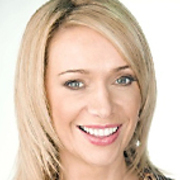
Alison Mau
Although she became a familiar face on New Zealand television screens, Melbourne-born Alison Mau began her journalism career in Australia. She first entered the media in 1983, as a cadet journalist on Northern Victoria's Warracknabeal Herald. A move back to her hometown saw her completing a three year cadetship on The Melbourne Herald, then doing general news and feature writing.
Seeking overseas experience, Mau headed to London in 1990. There she landed her first TV job — with Intervoice, a company making programmes for the then fledgling BBC World Satellite channel. Along with future ITV newsreader Mary Nightingale, Mau shared presenting and production duties on World Business Report, a show that would later make a star of business reporter Richard Quest.
At the same time she presented a live insert for the evening bulletin on Taiwanese channel CTS, wrapping up the day's events in Europe. When the first Gulf War broke out, the slot grew from two minutes at the top of the broadcast, to eight or nine minutes live. The network's audience was numbered in the tens of millions.
During this period she was invited to speak on satellite broadcasting at a conference in Taiwan. The keynote speaker was the Dean of Journalism at New York's Columbia University, who offered her the chance to do postgraduate studies at Columbia. "Bizarrely, I turned him down," says Mau. "To this day it remains my one professional regret."
In 1993 Mau returned to Melbourne, and a job at Channel 9. There she worked on local current affairs show The Melbourne Report. Three months later the show was axed and Mau made redundant. Australia's loss was New Zealand's gain, as Mau sought work across the Tasman.
Her first job in New Zealand was on an early form of magazine-style current affairs. Made in New Zealand, focused on successful Kiwi businesses. Mau caught the eye of TV One news executives.; in 1994 she moved to anchoring and reporting on short-lived late evening news and current affairs show Eyewitness. She was then seconded to TV2's popular Newsnight, co-presenting with Marcus Lush and Simon Dallow. Mau sees the show as an early forerunner of formats like Seven Sharp and The Project.
A memorable moment was the 1997 death of Princess Diana in a car accident. Initial reports suggested that Diana was injured, and in hospital; the news of her death came as a shock to those in the newsroom. "There was no time to prepare," Mau says, "I had to break the news to the country live and unscripted. That day, and her funeral the following week were emotional and very affecting. "
A change of pace saw Mau land a new role in 2000, co-hosting Breakfast with Mike Hosking. "Breakfast television is fantastic, apart from the hours, which kill you," she says. A highlight of the period was covering the America's Cup in Auckland. With the birth of her second child, Mau returned to weekend news presenting for the next few years. She was also nominated for a New Zealand Television Award after co-hosting "flagship" lifestyle show Home Front with Dave Cull, future mayor of Dunedin.
Mau was back with Breakfast in 2004. But with the departure of Hosking that year, Mau found herself alone on the couch for seven months, sometimes handling as many as 13 interviews in a morning. It was tough going. She says her sanity was saved by the arrival in August of the "very funny", but sometimes inappropriate, Paul Henry.
At the end of 2004, Mau was enticed to leave TVNZ and join Paul Holmes at Prime. She worked as a reporter and back-up host for Holmes until early 2006. Mau talks about working with both Henry and Holmes in this video interview — plus her dissatisfaction with her treatment by the channel's owners, and her time co-presenting Seven Sharp.
In 2008 she was back with TVNZ as a fill-in Breakfast host, and newsreader across multiple bulletins: Breakfast, Tonight and One News at Six.
Two years later Mau joined the ranks of consumer programme Fair Go, one of the longest running series on Kiwi television. Mau loved the chance to enter the world of advocacy journalism.
In early 2013 she took up the opportunity to join the trio of presenters on new, five-night-a-week primetime show Seven Sharp, TV One's replacement for the long-running Close Up. When the Seven Sharp line-up underwent change at the end of the first year, Mau began a four year gig at talkback station RadioLIVE, initially in an afternoon slot with Willie Jackson. Mau has also been a fill-in host on both 2014's Paul Henry Show, and multi-media morning slot Paul Henry.
After revelations of sexual misconduct by movie executive Harvey Weinstein in late 2017, Mau expected that the me too. movement would arrive in New Zealand. In March 2018 she announced the launch of #MeTooNZ. Her aim was for "a planned, organised outlet for survivors of workplace sexual harassment to come forward with their stories, access support, and help stop repeat predatory behaviour in Kiwi workplaces." Mau was leading a team of journalists from website Stuff.
Profile written by Keith Tannock
Published on 13 November 2012; updated on 15 March 2018
Sources include
'Alison Mau: On the rewards and challenges of TV presenting ...' (Video Interview) NZ On Screen website. Director Andrew Whiteside Loaded 22 May 2017. Accessed 15 March 2018
Alison Mau, 'Nobody else launched a rigorous #metoo investigation - so I thought, bugger it, let's go' Stuff website. Loaded 4 March 2018. Accessed 15 March 2018
Alex Casey, 'I've already had my heart broken multiple times': Ali Mau on hearing the stories of #MeTooNZ' (Interview) The Spinoff website. Loaded March 2018. Accessed 15 March 2018
'Profile: Ali Mau' (broken link) TVNZ website. Loaded 8 January 2013. Accessed 11 December 2015